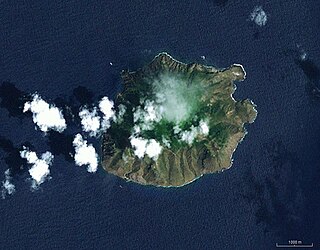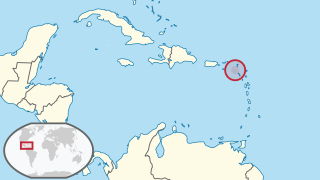Related Research Articles

The Netherlands Antilles, also known as the Dutch Antilles, was a constituent Caribbean country of the Kingdom of the Netherlands consisting of the islands of Saba, Sint Eustatius, and Sint Maarten in the Lesser Antilles, and Aruba, Curaçao, and Bonaire in the Leeward Antilles. The country came into being in 1954 as the autonomous successor of the Dutch colony of Curaçao and Dependencies, and it was dissolved in 2010, when like Aruba in 1986, Sint Maarten and Curaçao gained status of constituent countries within the Kingdom of the Netherlands, and Saba, Sint Eustatius, and Bonaire gained status of special municipality of Netherlands as the Caribbean Netherlands. The neighboring Dutch colony of Surinam in continental South America, did not become part of the Netherlands Antilles but became a separate autonomous country in 1954. All the territories that belonged to the Netherlands Antilles remain part of the kingdom today, although the legal status of each differs. As a group they are still commonly called the Dutch Caribbean, regardless of their legal status. People from this former territory continue to be called Antilleans in the Netherlands.

Saba is a Caribbean island and the smallest special municipality of the Netherlands. It consists largely of the dormant volcano Mount Scenery, which at 887 metres (2,910 ft) is the highest point of the entire Kingdom of the Netherlands. The island lies in the northern Leeward Islands portion of the West Indies, southeast of the Virgin Islands. Together with Bonaire and Sint Eustatius it forms the BES islands, also known as the Caribbean Netherlands.

Sint Eustatius, known locally as Statia, is an island in the Caribbean. It is a special municipality of the Netherlands.

The SSS islands, locally also known as the Windward Islands, is a collective term for the three territories of the Dutch Caribbean that are located within the Leeward Islands group of the Lesser Antilles in the Caribbean Sea. In order of population size, they are: Sint Maarten, Sint Eustatius, and Saba. In some contexts, the term is also used to refer to the entire island of Saint Martin, alongside Sint Eustatius and Saba.
The Scout and Guide movement in the Dutch Caribbean is served by

The Netherlands Antilles was an autonomous Caribbean country within the Kingdom of the Netherlands. It was dissolved on 10 October 2010.

The Kingdom of the Netherlands, commonly known simply as the Netherlands, is a sovereign state consisting of a collection of constituent territories united under the monarch of the Netherlands, who functions as head of state. The realm is not a federation; it is a unitary monarchy with its largest subdivision, the eponymous Netherlands, predominantly located in Northwestern Europe and with several smaller island territories located in the Caribbean.

The following is an alphabetical list of topics related to the former nation of the Netherlands Antilles.

The Dutch Caribbean Coast Guard (DCCG) is the coast guard of the Kingdom of the Netherlands in the Dutch Caribbean. The unit is a joint effort of all constituent countries within the Kingdom. Prior to the dissolution of the Netherlands Antilles in 2010, it was known as the Netherlands Antilles and Aruba Coast Guard and was a division of the Royal Netherlands Navy.

The Caribbean Netherlands is a geographic region of the Netherlands located outside of Europe, in the Caribbean, consisting of three special municipalities. These are the islands of Bonaire, Sint Eustatius, and Saba, as they are also known in legislation, or the BES islands for short. The islands are officially classified as public bodies in the Netherlands and as overseas territories of the European Union; as such, European Union law does not automatically apply to them.

A common visa exists since the end of 2010 for the territories of Aruba, Curaçao, Sint Maarten and the Caribbean Netherlands which form together the territory of the Kingdom of the Netherlands in the Caribbean. The visa is not valid for the European part of the Netherlands, which is part of the Schengen Area.
In the Netherlands, the term public body is the general denomination for administrative divisions within the Dutch state, such as the central government, a province, a municipality or a water board. These types of political entities are defined by the Constitution of the Netherlands.
The three public bodies of Bonaire, Sint Eustatius and Saba started issuing postal stamps after the dissolution of the Netherlands Antilles in 2010. The islands form a separate postage region under the name Caribisch Nederland .

The Dutch Caribbean are the New World territories, colonies, and countries of the Dutch Empire and the Kingdom of the Netherlands located in the Caribbean Sea, mainly the northern and southwestern regions of the Lesser Antilles archipelago.
An island council was the governing body of an island territory, an administrative level of the Netherlands Antilles until its dissolution.

Jaime Mercelino Saleh is a Dutch Antillean politician and former judge. He was a judge on the Joint Court of Justice of the Netherlands Antilles from 1974 to 1990 and was its president from 1979. Saleh subsequently served as Governor of the Netherlands Antilles between 1990 and 2002.
Same-sex marriage has been legal in Bonaire, Sint Eustatius and Saba since 10 October 2012, the effective date of legislation passed by the States General of the Netherlands enabling same-sex couples to marry. The Caribbean Netherlands was the first jurisdiction in the Caribbean to legalise same-sex marriage, and was followed a few months later by French territories, including Guadeloupe and Martinique, in May 2013.

Lesbian, gay, bisexual, and transgender (LGBT) rights in Saba are very progressive by Caribbean standards. Saba forms part of the Caribbean Netherlands and is a special municipality of the Netherlands. Both male and female same-sex sexual activity are legal in Saba, with same-sex marriage and adoption being legal since 2012. In addition, discrimination on the basis of "heterosexual and homosexual orientation" is outlawed.
Island council elections were held in the Netherlands Antilles on 7 April and 12 May 1995 to elect the members of the island councils of its five island territories. The election was won by the Bonaire Democratic Party in Bonaire, the Party for the Restructured Antilles in Curaçao, the Saba Democratic Labour Movement in Saba, the Democratic Party Statia in Sint Eustatius, and the Democratic Party in Sint Maarten.

M. Alida U. Francis is a Dutch civil servant who has been appointed island Governor of Sint Eustatius on April 10, 2024. She is the first woman to hold this position.
References
- ↑ "About The Public Prosecution Services - Openbaar Ministerie-Curacao-Sint Maarten-BES Islands". Openbaar Ministerie-Curacao-Sint Maarten-BES Islands. Retrieved 2018-07-05.
- ↑ "Farewell reception for Chief Prosecutor David van Delft - Dutch Caribbean Legal Portal". www.dutchcaribbeanlegalportal.com. Retrieved 2018-07-05.
- ↑ "Henry Hambeukers nieuwe Hoofdofficier BES-eilanden - BearingPoint Caribbean". BearingPoint Caribbean. 2014-05-10. Retrieved 2018-07-05.
- ↑ "Nieuwe hoofdofficier voor de BES-eilanden - Bonaire.Nu". Bonaire.Nu (in Dutch). 2018-04-13. Retrieved 2018-07-05.
- ↑ Ministerie van Algemene Zaken (2021-02-26). "Benoeming hoofdofficier van justitie voor Bonaire, Sint Eustatius en Saba - Nieuwsbericht - Rijksoverheid.nl". www.rijksoverheid.nl (in Dutch). Retrieved 2021-06-20.